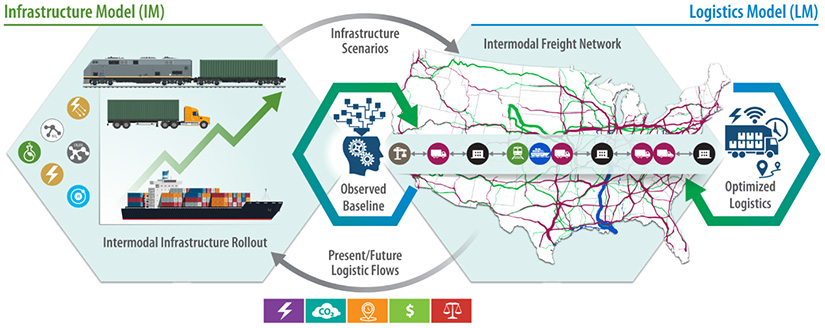INFORMES: INtermodal Freight Optimization for a Resilient Mobility Energy System
INtermodal Freight Optimization for a Resilient Mobility Energy System (INFORMES) is a modeling framework capable of supporting strategic nationwide rollout of advanced freight technologies and guiding efficient operations.

Intermodal freight transportation is a promising strategy to optimize the movement of goods across the United States. By blending two or more freight modes—including rail, maritime, and truck transit—to maximize the efficiencies of each without requiring goods to be repackaged, intermodal freight movement can create significant cost and energy savings.
But intermodal strategies pose logistical and operational challenges. In response, NLR researchers are building the first systematic modeling tool for national intermodal freight movement, infrastructure planning, logistics, and operations: INFORMES.

While existing intermodal freight modeling tools are stovepiped, INFORMES represents a fully integrated tool that can simulate and optimize both logistics and advanced infrastructure implementation.
Approach and Uses
INFORMES evaluates the cost-effectiveness and efficiency of operational strategies for intermodal freight transportation and the effectiveness of advanced freight technologies. It focuses on the entire freight network, from trucking to rail and maritime freight transportation.
The system will include:
- A comprehensive modeling framework that captures the interplay between emerging technology/infrastructure scenarios and intermodal freight traffic at the national level
- Robust optimization of intermodal freight operations through simulation of intermodal shipment, background traffic, and unforeseen events
- Data-driven event-based modeling, balancing resolution of models and computational time
- An easy-to-execute and publicly accessible software tool for evaluating the spatial-temporal deployment of advanced technologies and associated system operations
- Ability to generate effective and resilient intermodal freight operations strategies to minimize energy consumption, delivery times, and all major costs.
Combined, these insights will enable decision makers in redesigning the freight infrastructure and intermodal logistics system to prioritize resilience, minimize costs, and maximize whole-system effectiveness.
To learn more, read the news story NLR's INFORMES Tool Will Accelerate the Future of Intermodal Freight.
Publications
INFORMES: INtermodal Freight Optimization for a Resilient Mobility Energy System, ARPA-E Presentation (2024)
Contact
Contact us to learn more about the INFORMES framework or to explore related partnership opportunities.
Share
Last Updated Dec. 6, 2025
